-
Annual Development Report
Exploration of Foods and Foodomics in 2024:Review and Prospects
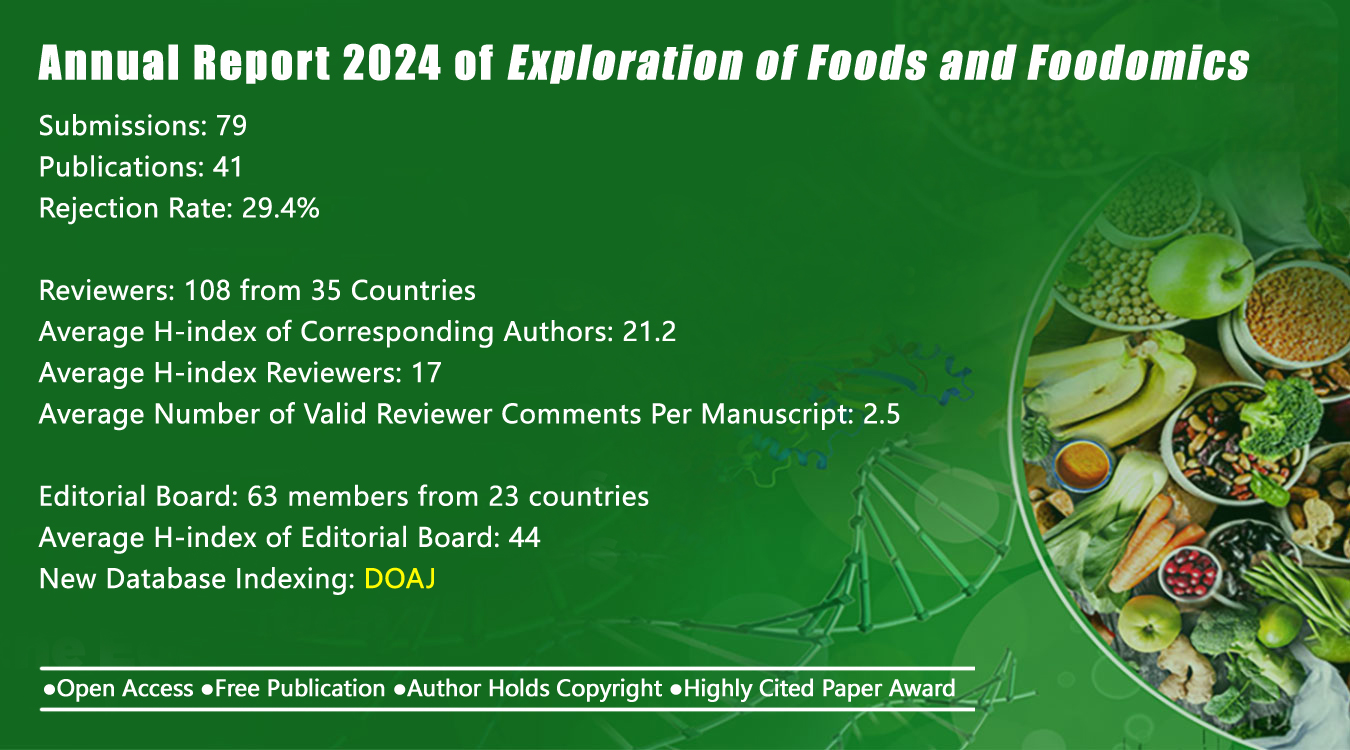
Exploration of Foods and Foodomics (EFF), an open access journal launched in April 2023, is dedicated to advancing high-quality research in food science, foodomics, and their interdisciplinary intersections. It emphasizes innovation and rigor in critical areas like food safety and nutrition, serving as a platform for global academic exchange.
EFF achieved a pivotal milestone in September 2024 with its inclusion in the Directory of Open Access Journals (DOAJ), a testament to its adherence to open-access standards and growing recognition in the scientific community. Over the past year, EFF has made significant strides in its development, including increasing its visibility, impact, and influence within the academic community. This report highlights the key achievements and provides an outlook for 2025.
Key Achievements in 2024
Manuscript Submission and Publication
Submission Volume and Types
In 2024, EFF received 79 manuscripts, a 58% increase from 50 in 2023. This growth shows the journal's rising influence and recognition among researchers, likely due to its quality research, efficient editorial processes, and focus on relevant topics. The submitted articles included 46 Original Articles (58.2%), 29 Review Articles (36.7%), and 4 Others (5.1%). The high number of Original and Review Articles indicates that EFF is a key platform for researchers to share new findings, whether through experimental results, theoretical frameworks, or fresh insights into existing issues. This highlights the journal's role in promoting innovative research and attracting scholars who want to make an impact in their fields.
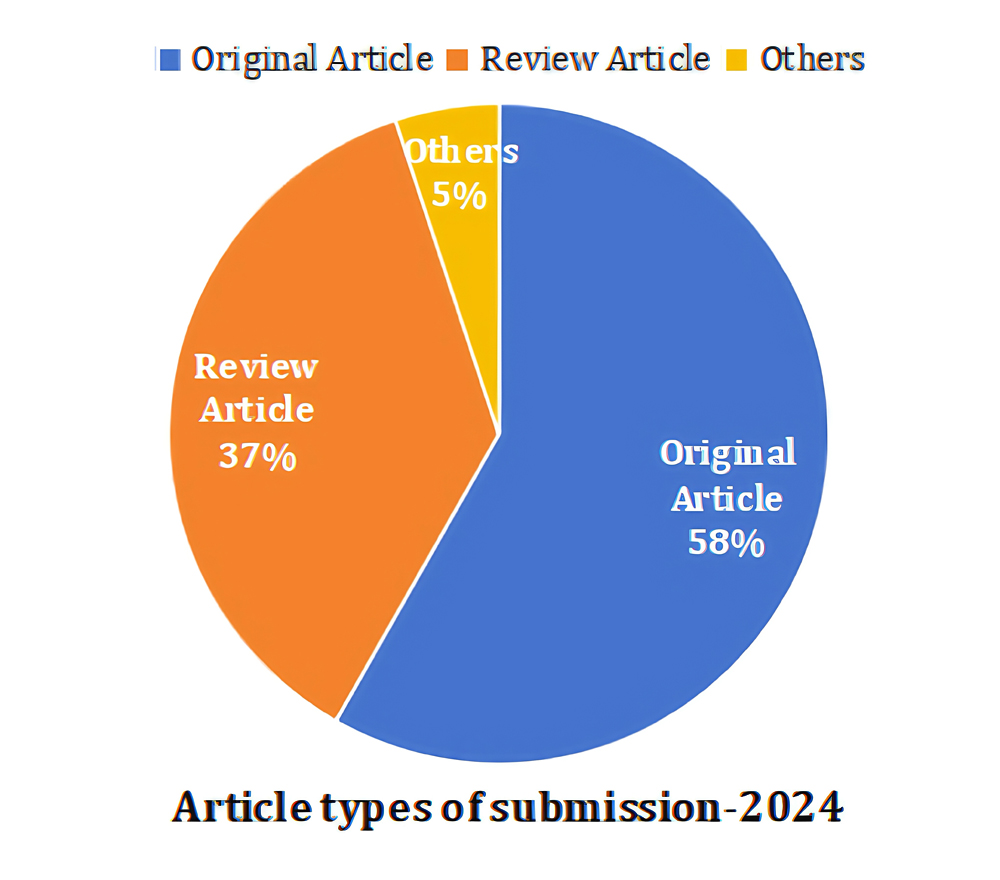
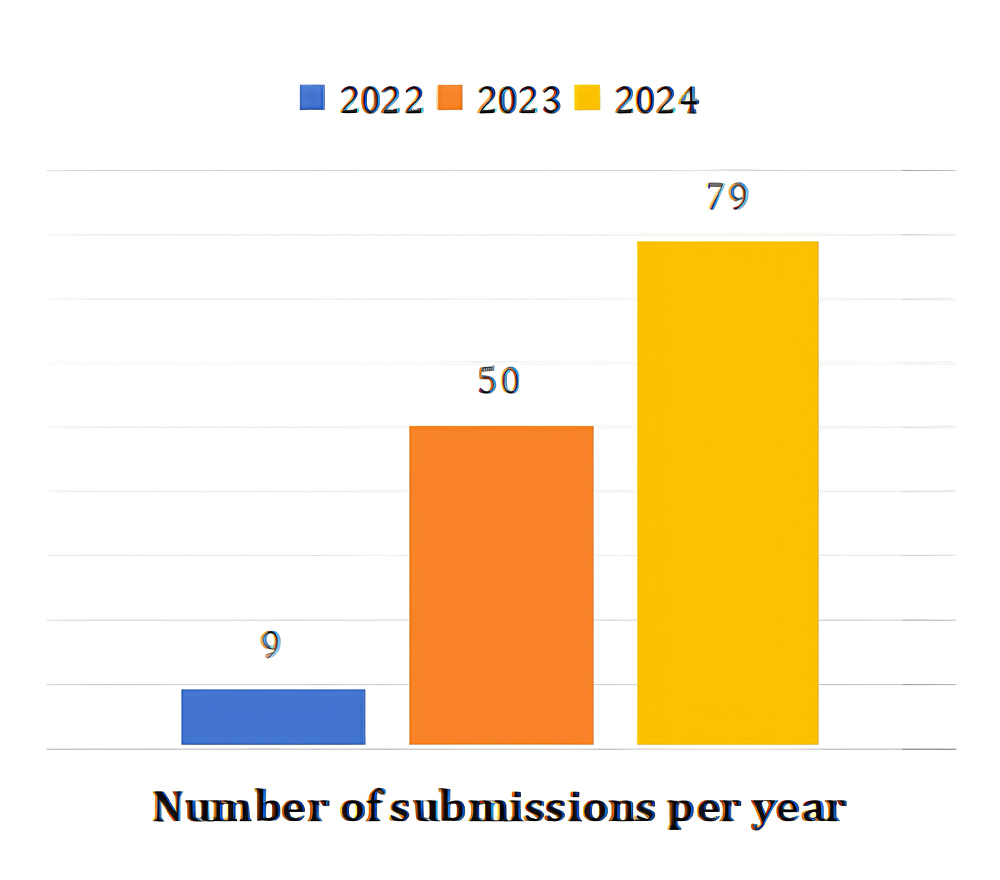
Total Publications
EFF published 41 articles in 2024. This represents a notable increase compared to the 22 articles published in 2023, indicating a positive upward trend in the journal's productivity and capacity to disseminate research findings. The articles included 19 Reviews (46.4%), 18 Original Articles (43.9%), and 4 Perspectives/Short Communications (9.7%). This mix demonstrates EFF's commitment to both synthesizing existing knowledge and presenting new research, while also providing diverse content to meet the needs of the academic community.
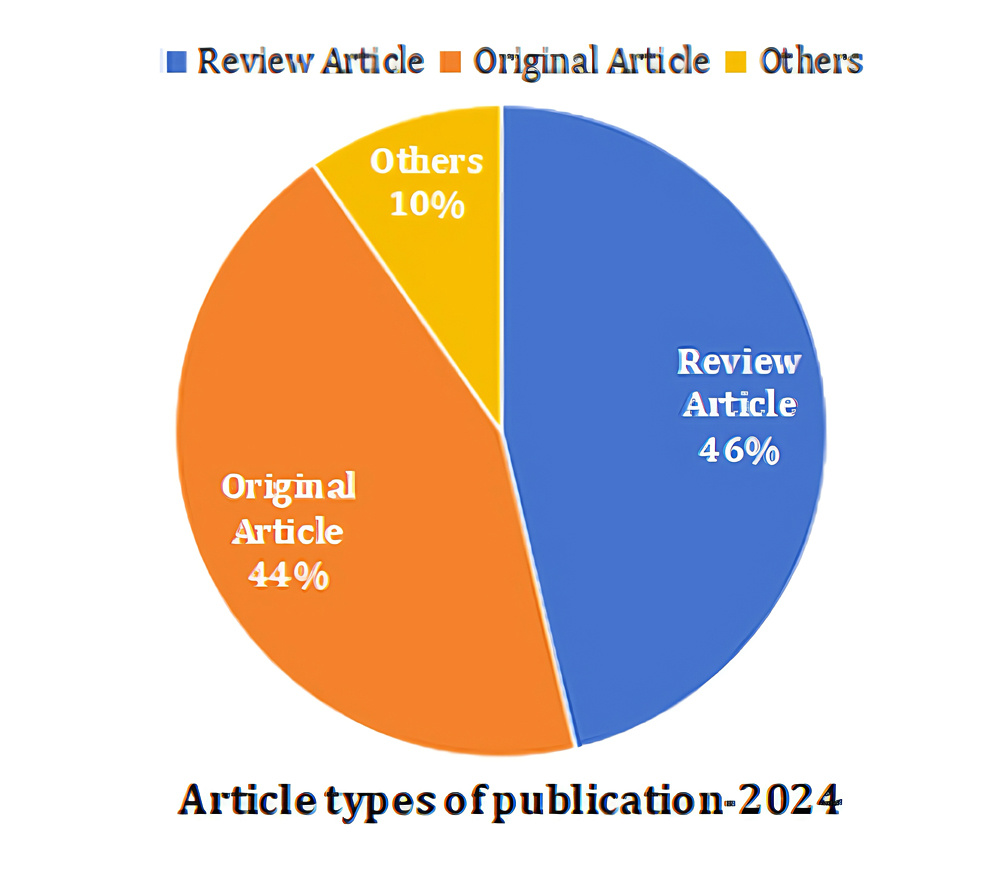
Average Impact of Authors
The average H-index of corresponding authors is 21.2, and that of first authors is 11.2. EFF will work harder to invite more high-quality manuscripts and increase the participation of first authors with rich experience to improve the quality and impact of publications.
Publication Article Corresponding Author Country Distribution
The published articles include 41 corresponding authors from 17 different countries and regions. This indicates EFF's strong appeal to researchers in regions with advanced academic development. To enrich content diversity and promote global inclusivity, the journal will make more efforts to engage with researchers from different countries and regions in the future.
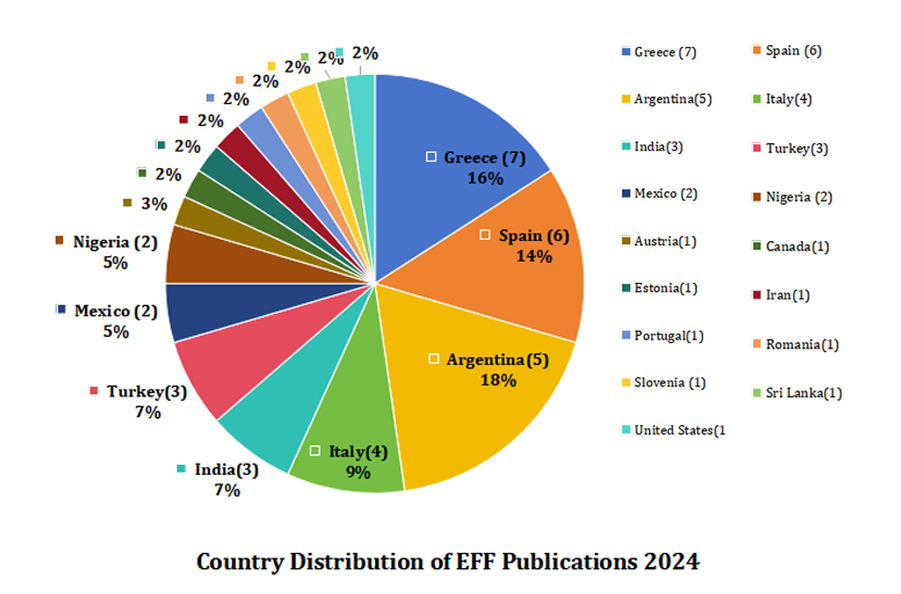
Journal Article Data Highlights
EFF has seen 4 articles with over 1000 views and 100 downloads, a testament to the significant attention these articles have garnered. This is likely due to relevant topics or novel findings. The average view count of 1409 and average download count of 45.3, which suggest that our articles are attracting a dedicated readership. Moving forward, we plan to build on this success by targeting popular topics and promoting high-potential content.
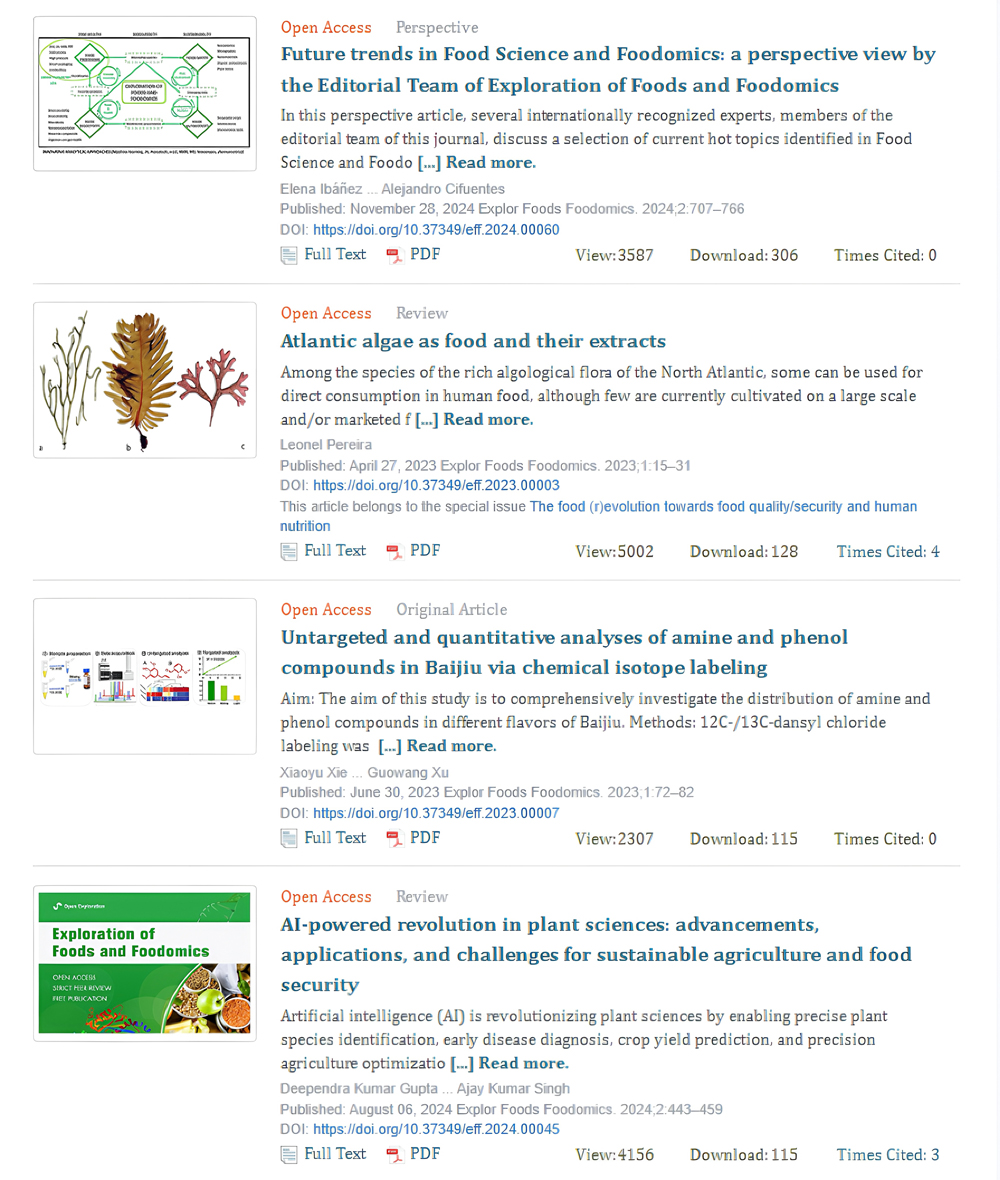
Featured Article
The article "Future trends in Food Science and Foodomics: a perspective view by the Editorial Team of Exploration of Foods and Foodomics," co-authored by the editors-in-chief Professor Alejandro Cifuentes, Professor Elena Ibáñez and 30 editorial board members, has garnered significant attention since its publication. Within two months, it has achieved over 3000 views and 300 downloads. Its popularity on platforms like ResearchGate and LinkedIn highlights the high relevance of the topic to current research hotspots. The authority of the editorial board team has attracted researchers seeking professional and cutting-edge insights. The high number of downloads indicates that many researchers find the article valuable for in-depth reading and potential citation, which will promote the academic development of food science and foodomics.
Manuscript Processing
Rejection Rate
The rejection rate rose slightly to 29.4% in 2024 from 25.9% in 2023. This suggests the journal is becoming more selective, a positive sign of its commitment to maintaining high academic standards.
Manuscript Processing Time
Despite the increased manuscript load, key processing times such as Initial Review (7.8 days) and Submission to Acceptation (89 days) have remained stable, demonstrating our efficient management. Besides, 14 days of the initial rejection time and 44 days of the first round review time improvements facilitate the quicker dissemination of research and provide more timely feedback to authors, thereby enhancing the journal's appeal.
Reviewers
In 2024, 108 reviewers from 35 different countries participated in our review process. This large and diverse group of reviewers ensures a broad range of perspectives and expertise, crucial for the quality and validity of published research. It also reflects the journal's international reach and recognition, contributing to its ability to publish high-quality, globally-relevant research.
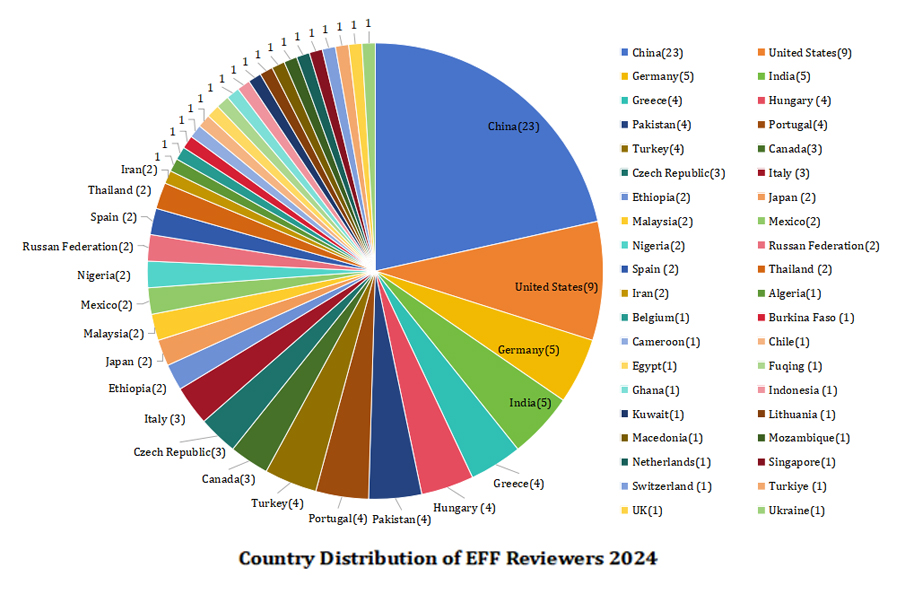
Editorial Board
New Editorial Board Members in 2024
In 2024, EFF added 8 new editorial board members from the US, Argentina, Ireland, Iran, Turkey, the UK, Chile, and Colombia. Their diverse backgrounds enhance the journal's global perspective and academic influence, with an average H-index of 43. Notably, Professor Charles Okpala submitted a high-quality manuscript, and Professor Gomez-Zavaglia Andrea completed a special issue, both boosting the journal's reputation.
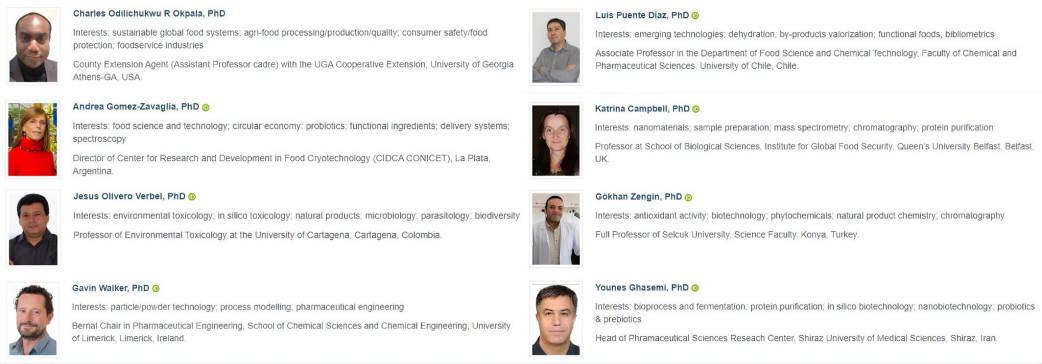
Current Editorial Board
With 63 members (24 AE and 39 EBM) from 23 countries/regions and an average H-index of 44, the EFF editorial board is highly qualified. In 2024, 46 members (73%) contributed through manuscript submission, special issue organization, conference promotion, or reviewing. This active engagement is crucial for the journal's operation and growth.
Editorial Board Meeting
The first EFF editorial board meeting on April 17, 2024, via Zoom, involved the editors-in-chief, key staff, and 12 board members. The meeting proposed collaborations between board members and the editor-in-chief to write an Original Article to boost accessibility and a Perspective article to spark academic discussions. It also decided to continue reward policies and encourage board members to promote the journal at international conferences and on social media to increase visibility. The positive feedback received, such as the successful co-authored article and commitments from board members to contribute more, indicates that the initiatives are effective and promising for the journal's growth in manuscript quality and international influence.
Special Issues
Completed Special Issue (2024)
The special issue "Delivery of Hydrophobic Compounds in Food Systems" was a great success in 2024, with 6 articles published that garnered an average of over 1800 views each, highlighting its significance and quality. The 8 citations received demonstrate the research's influence, suggesting valuable contributions that encourage further exploration in this area.
Hot Special Issue
The "Metrological Aspects in the Analysis of Nutrients, Functional Compounds, Additives and Contaminants in Food and Feed" special issue is thriving, with 13 articles published and more to come. This shows strong researcher interest in accurate food analysis, vital for food safety and quality. The articles' publication and attention indicate high journal standards. They likely offer significant research value, tackling key food analysis aspects such as new techniques or understanding nutrient behavior during processing.
Highlighted Article in a Special Issue
The article "Atlantic algae as food and their extracts" in the "The food (r)evolution towards food quality/security and human nutrition" special issue has over 5000 views and 4 citations, showing its popularity and research value. Atlantic algae's potential health and nutritional benefits make it an emerging research area. This article could shape future food and nutrition research, exploring Atlantic algae's potential for functional foods and sustainable systems.
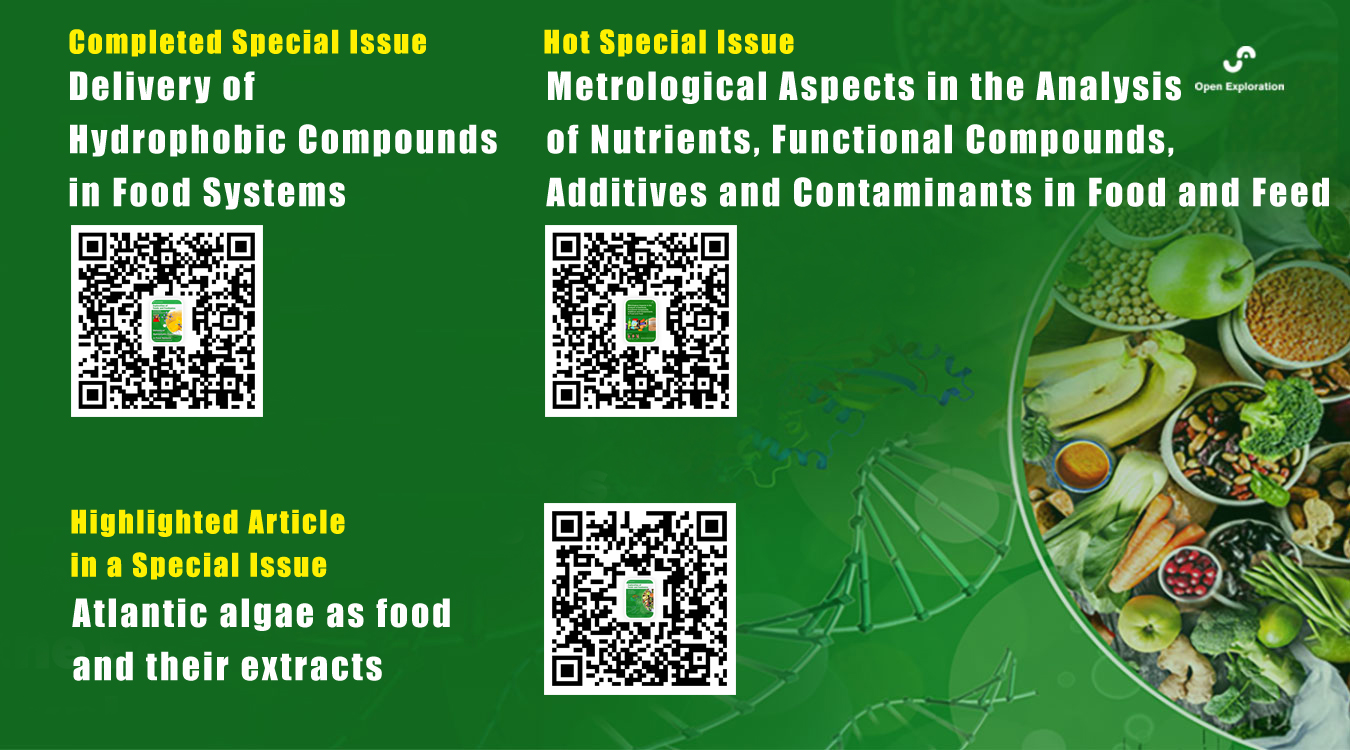
Database indexing
In 2024, a key milestone for EFF was its inclusion in the Directory of Open Access Journals (DOAJ), which significantly enhances the journal's visibility, accessibility, and credibility. This achievement underscores our commitment to high editorial standards and ethical publishing practices. Additionally, EFF is indexed in several other databases, including Google Scholar, Dimensions, MyScienceWork, and Portico, which help extend our reach across diverse academic communities. Looking ahead, we are determined to further elevate EFF’s profile by applying for inclusion in prestigious databases such as Scopus and Web of Science (WOS).
Social Media & Promotion
EFF's social media presence, especially on LinkedIn, has grown significantly, with 7714 connections (up 2884) and 3204 journal homepage followers (up 990), broadening its reach and engagement. This growth has led to increased article views, downloads, and citations, highlighting the success of our social media marketing efforts. A post promoting a co-authored article by the editor-in-chief and 30 editorial board members received over 66 likes and 14 shares, demonstrating our content's resonance with the audience and its potential to attract new viewers and authors. The shares extended the article's reach, enhancing its visibility and the journal's reputation. This success underscores the importance of high-quality content in social media marketing and will guide future promotion strategies to further boost EFF's social media presence and academic influence.
Goals and Expectation
In 2025, EFF Journal aims to boost its academic visibility and impact. We'll enhance article promotion via social media, email newsletters, and academic platform collaborations to raise the journal's profile and impact factor. We also plan to apply for Scopus inclusion in the second half of 2025, which will greatly improve our discoverability and attract high-quality submissions.
We've set a goal of achieving an average citation of 1.2 by attracting quality papers and encouraging authors to engage with existing literature. We'll participate in 2-3 international academic conferences to expand our influence and explore special issues related to conference themes.
We're excited about these initiatives and welcome collaborators to join us. Whether through co-organizing events, submitting articles, or sharing expertise, we believe collaboration will amplify our impact and advance knowledge in our field. Let's work together to create more opportunities for researchers and the academic community.
Best Regards,
EFF Editorial Office
Contact us: effjournal@explorationpub.com
EFF website: https://www.explorationpub.com/Journals/eff
Submission Link: https://eff.aressystem.com/
 Annual Development Report for EFF - 2024.pdfFeb. 24, 2025
Annual Development Report for EFF - 2024.pdfFeb. 24, 2025 -